Traditional monkey circus show faces dilemma
 0 Comment(s)
0 Comment(s) Print
Print E-mail Xinhua, October 30, 2014
E-mail Xinhua, October 30, 2014
| Monkey circuses are a traditional art form in Xinye County and listed as an intangible cultural heritage by Henan Province in 2009. |
Monkey trainer Bao Fengshan has not yet recovered from the recent shock of his arrest.
Four months ago, four trainers including Bao, along with six monkeys, were detained by police when performing on the streets of Mudanjiang City, northeast China's Heilongjiang Province, because they did not have a wildlife transportation license.
Instead of taking advantage of the slow farming season, one of the best for performances, he's decided to agonize at home alongside his monkeys.
In his small village in Xinye County, central China's Henan Province, 2,000-plus km away from where he was arrested, fellow performers hear about Bao's experience and feel his anguish.
A local court saw the case in late September and said he and his fellow trainers committed the crime of illegally transporting rare wildlife. But the court was lenient, allowing them to avoid criminal penalties.
When they were released, Bao found one of his monkeys, the 12-year-old Adan, had died. He buried it in an unknown mountain, and left for home with a broken and perplexed heart.
"More cities crop up in the country, but we find fewer performing places for our monkey circus," the 51-year-old Bao said.
The figure of monkey, represented by Sun Wukong, the Monkey King in the classic novel Journey to the West, is traditionally popular among Chinese people.
Monkey circuses are a traditional art form in Xinye County and listed as an intangible cultural heritage by Henan Province in 2009. Its origins date back over 2,000 years during the Eastern Han Dynasty.
The circus does not need any stages or spotlights. What they simply need is a vacant lot. Trainers and their monkeys travel around the country and perform difficult routines to amuse audiences, who give applause and money at their discretion.
But over the past three decades, this traditional art has faced a dilemma with China's rural and urban changes, experiencing conflict between traditional culture and modern civilization.







Go to Forum >>0 Comment(s)